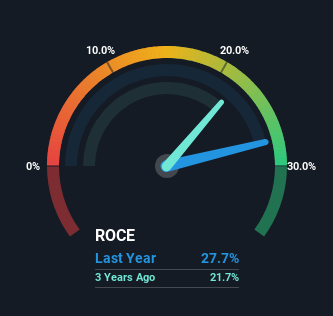- United States
- /
- Food and Staples Retail
- /
- NasdaqGS:COST
Returns on Capital Paint A Bright Future For Costco Wholesale (NASDAQ:COST)

Finding a business that has the potential to grow substantially is not easy, but it is possible if we look at a few key financial metrics. Ideally, a business will show two trends; firstly a growing return on capital employed (ROCE) and secondly, an increasing amount of capital employed. Put simply, these types of businesses are compounding machines, meaning they are continually reinvesting their earnings at ever-higher rates of return. Speaking of which, we noticed some great changes in Costco Wholesale's (NASDAQ:COST) returns on capital, so let's have a look.
Return On Capital Employed (ROCE): What Is It?
For those that aren't sure what ROCE is, it measures the amount of pre-tax profits a company can generate from the capital employed in its business. To calculate this metric for Costco Wholesale, this is the formula:
Return on Capital Employed = Earnings Before Interest and Tax (EBIT) ÷ (Total Assets - Current Liabilities)
0.28 = US$9.0b ÷ (US$68b - US$35b) (Based on the trailing twelve months to May 2024).
Therefore, Costco Wholesale has an ROCE of 28%. In absolute terms that's a great return and it's even better than the Consumer Retailing industry average of 10%.
Check out our latest analysis for Costco Wholesale

In the above chart we have measured Costco Wholesale's prior ROCE against its prior performance, but the future is arguably more important. If you'd like, you can check out the forecasts from the analysts covering Costco Wholesale for free.
What The Trend Of ROCE Can Tell Us
The trends we've noticed at Costco Wholesale are quite reassuring. Over the last five years, returns on capital employed have risen substantially to 28%. Basically the business is earning more per dollar of capital invested and in addition to that, 56% more capital is being employed now too. So we're very much inspired by what we're seeing at Costco Wholesale thanks to its ability to profitably reinvest capital.
On a separate but related note, it's important to know that Costco Wholesale has a current liabilities to total assets ratio of 52%, which we'd consider pretty high. This effectively means that suppliers (or short-term creditors) are funding a large portion of the business, so just be aware that this can introduce some elements of risk. Ideally we'd like to see this reduce as that would mean fewer obligations bearing risks.
The Bottom Line
In summary, it's great to see that Costco Wholesale can compound returns by consistently reinvesting capital at increasing rates of return, because these are some of the key ingredients of those highly sought after multi-baggers. Since the stock has returned a staggering 240% to shareholders over the last five years, it looks like investors are recognizing these changes. In light of that, we think it's worth looking further into this stock because if Costco Wholesale can keep these trends up, it could have a bright future ahead.
While Costco Wholesale looks impressive, no company is worth an infinite price. The intrinsic value infographic for COST helps visualize whether it is currently trading for a fair price.
Costco Wholesale is not the only stock earning high returns. If you'd like to see more, check out our free list of companies earning high returns on equity with solid fundamentals.
New: AI Stock Screener & Alerts
Our new AI Stock Screener scans the market every day to uncover opportunities.
• Dividend Powerhouses (3%+ Yield)
• Undervalued Small Caps with Insider Buying
• High growth Tech and AI Companies
Or build your own from over 50 metrics.
Have feedback on this article? Concerned about the content? Get in touch with us directly. Alternatively, email editorial-team (at) simplywallst.com.
This article by Simply Wall St is general in nature. We provide commentary based on historical data and analyst forecasts only using an unbiased methodology and our articles are not intended to be financial advice. It does not constitute a recommendation to buy or sell any stock, and does not take account of your objectives, or your financial situation. We aim to bring you long-term focused analysis driven by fundamental data. Note that our analysis may not factor in the latest price-sensitive company announcements or qualitative material. Simply Wall St has no position in any stocks mentioned.
Have feedback on this article? Concerned about the content? Get in touch with us directly. Alternatively, email editorial-team@simplywallst.com
About NasdaqGS:COST
Costco Wholesale
Engages in the operation of membership warehouses in the United States, Puerto Rico, Canada, Mexico, Japan, the United Kingdom, Korea, Australia, Taiwan, China, Spain, France, Iceland, New Zealand, and Sweden.
Solid track record with excellent balance sheet.
Similar Companies
Market Insights
Community Narratives



